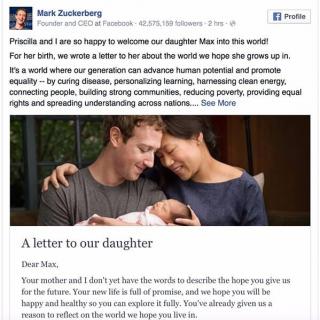
介绍:
Your mother and I have both taught students and we've seen what it takes to make this work. It will take working with the strongest leaders in education to help schools around the world adopt personalized learning. It will take engaging with communities, which is why we're starting in our San Francisco Bay Area community. It will take building new technology and trying new ideas. And it will take making mistakes and learning many lessons before achieving these goals.
But once we understand the world we can create for your generation, we have a responsibility as a society to focus our investments on the future to make this reality.
Together, we can do this. And when we do, personalized learning will not only help students in good schools, it will help provide more equal opportunity to anyone with an internet connection. Many of the greatest opportunities for your generation will come from giving everyone access to the internet.
People often think of the internet as just for entertainment or communication. But for the majority of people in the world, the internet can be a lifeline.
It provides education if you don't live near a good school. It provides health information on how to avoid diseases or raise healthy children if you don't live near a doctor. It provides financial services; if you don't live near a bank. It provides access to jobs and opportunities if you don't live in a good economy.
The internet is so important that for every 10 people who gain internet access, about one person is lifted out of poverty and about one new job is created. Yet still more than half of the world's population -- more than 4 billion people -- don't have access to the internet.
If our generation connects them, we can lift hundreds of millions of people out of poverty. We can also help hundreds of millions of children get an education and save millions of lives by helping people avoid disease.
This is another long term effort that can be advanced by technology and partnership. It will take inventing new technology to make the internet more affordable and bring access to unconnected areas. It will take partnering with governments, non-profits and companies. It will take engaging with communities to understand what they need. Good people will have different views on the best path forward, and we will try many efforts before we succeed. But together we can succeed and create a more equal world.
Technology can't solve problems by itself. Building a better world starts with building strong and healthy communities. Children have the best opportunities when they can learn. And they learn best when they're healthy.
Health starts early -- with loving family, good nutrition and a safe, stable environment. Children who face traumatic experiences early in life often develop less healthy minds and bodies. Studies show physical changes in brain development leading to lower cognitive ability. Your mother is a doctor and educator, and she has seen this firsthand.
If you have an unhealthy childhood, it's difficult to reach your full potential. If you have to wonder whether you'll have food or rent, or worry about abuse or crime, then it's difficult to reach your full potential. If you fear you'll go to prison rather than college because of the color of your skin, or that your family will be deported because of your legal status, or that you may be a victim of violence because of your religion, sexual orientation or gender identity, then it's difficult to reach your full potential.
(To be continued)
Ending Music:
Sophie Zelmani - Love
上一期: 【Facebook CEO致女儿的一封信】A letter to our daughter 02
下一期: 【Facebook CEO致女儿的一封信】A letter to our daughter 04
下一期: 【Facebook CEO致女儿的一封信】A letter to our daughter 04
大家还在听

